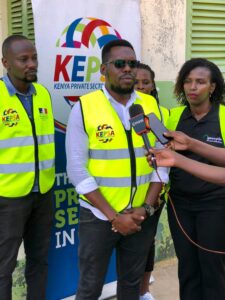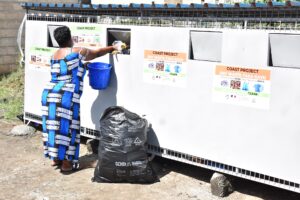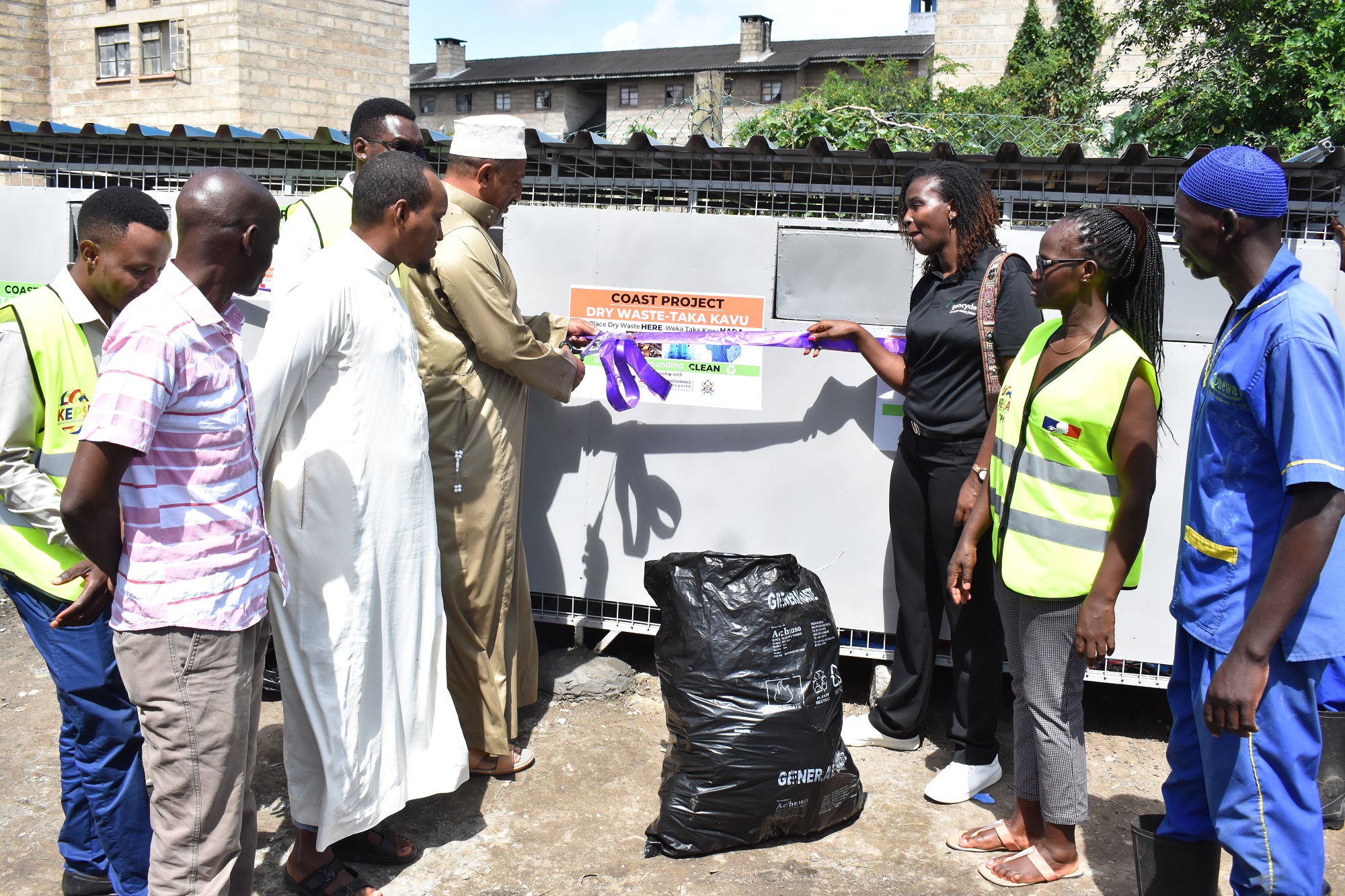On Friday, 22nd July, the Kenya Private Sector Alliance (KEPSA) Foundation through Sustainable Inclusive Business Kenya (SIB-K) partnered with the County Government of Mombasa to launch a public awareness campaign on the separation of waste at source. This partnership also saw the installation of a waste receptacle at the Manyimbo Estate and separation bins at the MaryCliff Primary School, both in Tudor Ward, a crucial step in bridging the gap in waste management infrastructure to actualize the concept of waste separation. This initiative brings the National Sustainable Waste Management Act to life.
Speaking after the launch of the receptacle, Sustainable Inclusive Business Program Manager Ebenezer Amadi noted, “The receptacle will help residents of this estate in Mombasa to separate their wet and dry waste. This will help the county implement the Sustainable Waste Management Act, which advocates for citizen engagement in taking care of the environment sustainably.”
KEPSA, through SIB-K, is committed to increasingly engaging citizens at all levels to create a mindset change and push for adopting a circular economy model that focuses on the collection, reuse, re-purpose, and recycling. The commitment is executed through partnerships and collaborations with implementing partners, including WWF-Kenya, Baus Taka, GeoCycle under Bamburi Cement and local authorities.

“Through Sustainable Inclusive Business, KEPSA is holding conversations with the Mombasa County Government to encourage them to invest in recycling infrastructure on waste management. We are also implementing the Kenya Plastics Pact, an initiative bringing all stakeholders together from across the plastics value chain, which will stimulate industry-led innovation, dialogue and public-private-community collaboration to find new ways to use plastic waste. As a result, we expect to see a cut-down on pollution and meet the needs of Mombasa residents facing some of the worst effects of climate change,” said Amadi.
The campaign is part of the COAST Project (Creating Opportunities and Alleviating Poverty through Sustainable Trade) launched in 2020, which has so far provided over 200 youth and women in Tudor Community with training on the waste-to-value concept. The training aimed to create awareness of the waste-to-value concept and increase the participants’ capacity to develop sustainable waste management business cases through mentorship. The project further empowered the trainees to harness their entrepreneurship skills, increased their capacity through training on financial literacy and business skills, and enhanced access to financing to support the establishment of businesses based on sustainable waste management models. The French Embassy has been instrumental in providing financial support for implementing the COAST Project through the PISSCA Funding.
About 150 households in Mombasa were sensitized to segregate waste at the household level. This will go a long way in spurring a circular economy and environmental sustainability in Mombasa County.

“This practice of separating our household waste at the source will help us because before the project, we used to openly dump all the waste together, which was very unsightly and harmful to our health,” Sheila Salano, Mombasa Resident and a COAST Project Beneficiary.
The receptacle at Manyimbo Estate will be managed by the residents, some of whom are direct beneficiaries of the COAST Project training, and the collection of the waste will be the responsibility of Mombasa County.
About KEPSA
The Kenya Private Sector Alliance (KEPSA) is the apex body of the private sector in Kenya. KEPSA brings together local and foreign business associations, chambers of commerce, professional bodies, corporates as multinational companies, medium, corporates, SMEs, and start-ups from all sectors of the economy in the country, representing over 1,000,000 million businesses under one umbrella to enable them to speak with one voice when engaging Government, development partners and other stakeholders on cross-cutting policy issues affecting private sector development and implements programs that ensure the growth of business and social – economic development of the country. KEPSA supports businesses with opportunities for training, networking, financial linkages, mentorships & coaching, access to markets, value chains, and investment opportunities with many partners worldwide. The corporate members are also based in all parts of the country or have offices or branches.
About Sustainable Inclusive Business
Sustainable Inclusive Business – Kenya (SIB-K) is a knowledge centre under the Kenya Private Sector Alliance (KEPSA) funded by the Netherlands Government. The project aims to encourage businesses to be sustainable and inclusive, positively impacting People, Planet, and Profit. This is achieved through sharing information on best practices and viable, sustainable business models, implementing sustainable business policies, and creating partnerships.
SIB-K is also the lead organization implementing the Kenya Plastics Pact. This ambitious, collaborative initiative is bringing together stakeholders across the whole plastics value chain to transform the current linear plastics system into a circular economy for plastics. All stakeholders sign up for a joint set of ambitious and time-bound targets, ensuring that this collaboration will drive significant change by 2030.
For Press Inquiries, Please Contact:
Josephine Wawira – Communications Lead, Sustainable Inclusive Business


